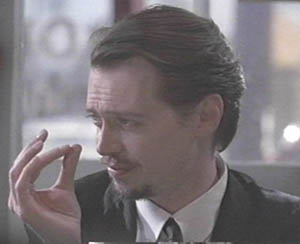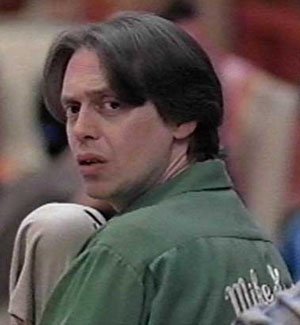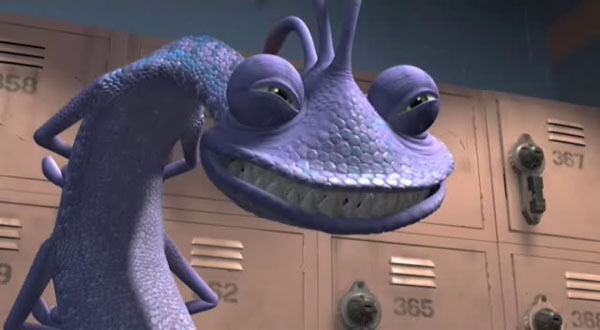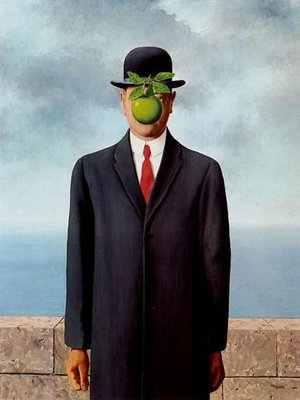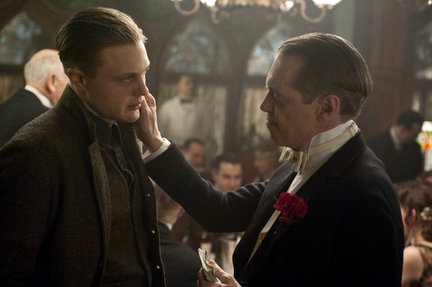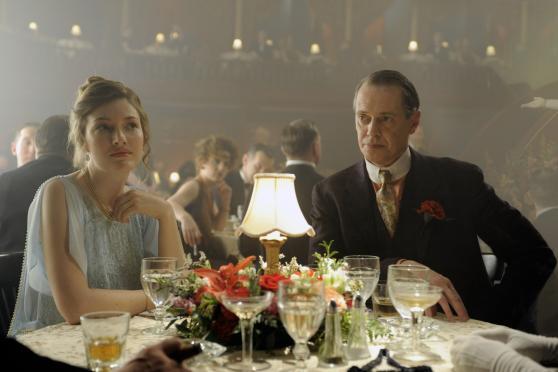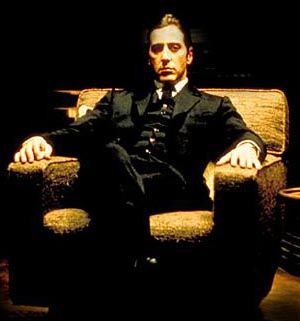Al Capone
Nucky Thompson: The Gangster who Won Me Over
When Boardwalk Empire premiered on September 1 of this year, I was unenthused with Terence Winter’s decision to cast Steve Buscemi in the role of the series’ central protagonist, Nucky Thompson. Traditionally the gangster hero is played by an actor (almost always male), who is formidable in stature (Vito Corleone), personality (Rico Bandello), or both (Tony Soprano). The gangster is the very definition of a “tough guy.” If he shoulder checks you on the street, you’re not going to demand an apology. The gangster inspires fear, even when he’s a puny as Little Caesar‘s (1931, Mervyn Leroy) Rico Bandello.
By contrast, Buscemi is a character actor best known for playing weaselly, neurotic, or pathetic characters. In Reservoir Dogs (1992, Quentin Tarantino) he objected to his assigned alias, Mr. Pink (“Why do I have to be Mr. Pink!”) and petulantly refused to tip his waitress, inspiring one of my favorite movie lines of all time:
Mr. Pink: [rubbing his thumb and index finger together] You know what this is? It’s the world’s smallest violin playing just for the waitresses.
In The Big Lebowski (1998, Joel and Ethan Cohen), he is Donny, one of The Dude’s (Jeff Bridges) bowling buddies. While good-natured, Donny is incredibly annoying and is often told to “Shut the fuck up!” Buscemi has a face that almost demands that it be told to “Shut the fuck up!”
Even when animated, as he is in Pixar’s Monsters, Inc. (2001), Buscemi plays Randall Boggs, a duplicitous chameleon who delights in his profession (the scaring of children), and is consumed with jealousy over the success of his rival, Sulley (John Goodman). As always, Buscemi’s character fails to master his bigger, smarter, braver and, almost always, better looking, foes.
As a fan of Buscemi’s work, this is how I like him. He is a “character actor,” after all. Character actors, by definition, are not the leading men. They are there to support, antagonize, or bewilder the leading men. Thus, I was surprised to hear that he was cast as the lead in a television series. A movie only demands that an actor be charismatic for 2 hours but a television series asks that actor to command the screen week after week. As I watched the opening credits of Boardwalk Empire, which, like The Sopranos, features its protagonist taking stock of his domain, I was doubtful:
Buscemi stands on the beach, looking like something out of a Magritte painting; he appears stylized and inscrutable, devoid of the fire and passion I expect of my gangster heroes. “This is not going to work,” I sighed to myself.
After the first few episodes of the series, I believed that I was right. A gangster story is only as good as its hero, and Boardwalk Empire lacked one. Nucky seemed too calm, too polite, too contained, too un-Buscemi-like, to carry the series. In his seminal piece on the genre, “The Gangster as Tragic Hero” (1948), Robert Warshow argued that “[t]he gangster’s whole life is an effort to assert himself as an individual to draw himself out of the crowd, and he always dies because he is an individual.” Thus, Nucky’s seemingly reasonable demeanor stands in stark contrast to one of the gangster hero’s central qualities: his excessive nature. The gangster’s outsized desires and ambitions are what lead to both his success as well as his demise.
Nucky, by contrast, appears to be a conciliatory man. He gives money to anyone who asks for it, endures back talk from his ward/employee, Jimmy Darmody (Michael Pitt), and wines and dines politicians whose piggish desires clearly disgust him. We don’t see Nucky lose his cool, punch a disrespectful underling, or accidentally kill anyone (as say, Tony Soprano might do). What kind of gangster hero is that?
But as I continued to watch the series I realized that Nucky was a great gangster hero and that Buscemi was nailing the role. While other gangster heroes are defined by their unbridled passion, their inability to contain their desires and emotions (such as Tom Powers’ suicidal decision to avenger his best friend’s murder in Public Enemy), Nucky’s power lies in his ability to be in control at all times. And given Buscemi’s small, 5 foot, 9 inch frame, such control makes sense. A Tony Soprano can throw a punch when he likes, but a little man like Nucky would invariably fail as a physical aggressor. Instead, Nucky must rely on his intellect and reason in order to remain dominant.
This quality is best exemplified in the finale, when Jimmy, who has recently discovered the role Nucky played in the procurement and rape of his mother at age 13, confronts Nucky at a party. Jimmy is not just angry about the abuse his mother endured, he is also hurt to discover that Nucky took care of him out of an obligation to the Commodore (Dabney Coleman), rather than out of love. Jimmy always saw Nucky was a father figure but he now realizes that Nucky just viewed him as another item on his long to-do list. When Jimmy directly poses this question to Nucky, the aging gangster responds, “What difference does it make?” Nucky seems almost perplexed by Jimmy’s anger, as if the love between a father and a son is incomprehensible to him. And given Nucky’s abusive relationship with his own father, it probably is.
Just because Nucky appears controlled on the outside does not mean the man is not excessive. He is just adept at having others enact his excess for him. For example, when Nucky discovers that Margaret Schroeder’s (Kelly MacDonald) husband, Hans, has beaten her to the point that she has a miscarriage, he decides to have the man killed. But Nucky’s decision proves to be dangerous to his empire. It attracts the interest of Federal Agent Nelson Van Alden (Michael Shannon), who is sure that the murder is somehow linked to Nucky. We only find out in the finale that Nucky’s decision to have Hans killed was based purely on emotion; his son died when he was just a few days old and therefore the death of any baby strikes a nerve. Even when telling this story to Margaret, Nucky’s emotions are barely visible, registered in the twitch of his lips or perhaps a moment when we can detect tears in his eyes. But only for a moment. Then he shakes it off and once again becomes “Nucky Thompson.” For this reason, one of my favorite moments of the season was when Nucky burned down his father’s home. It was so out of character for him, but also very revealing of the emotions he normally keeps buried.
Nucky must reign in his emotions and dispassionately govern those around him in order to maintain his power. The few moments when he does slip up and allow his emotions to take over, such as the murder of Hans, are the cause of most of his problems. Indeed, his hasty to decision to fire his brother Eli (She Wigham) will likely prove to be his greatest mistake yet: the finale closes with Eli, Jimmy, and the Commodore conspiring to oust Nucky from his seat at the top of the Boardwalk Empire.
In this way, Nucky hearkens back to one of cinema’s most beloved gangster hero’s, Michael Corleone (Al Pacino). Like Michael, Nucky uses reason to get ahead and both men know how to run a tight ship. Nucky and Michael embody the mantra, first articulated by Tony Camonte (Paul Muni) inScarface (1932, Howard Hawks) “Do it first, do it yourself, and keep on doing it.” However, both characters inevitably alienate those who love them most because of their inability to emotionally connect. Terence Winter must be aware of these parallels because the season finale clearly references The Godfather‘s famous Baptism scene:
In the above scene from The Godfather, Michael and his family are attending the baptism of their infant son. As Michael’s son is washed clean of his sins, and Michael repeats the prayers, his henchmen kill off his rivals one by one, thus securing his place at the top. Similarly, in Boardwalk Empire, Nucky speaks at a voter rally in support of his hand-picked candidate for mayor of Atlantic City. As Nucky assures the crowd that a Republican administration will crack down on crime, specifically seeking out the individuals who murdered five bootleggers in the woods at the beginning of the season (the true culprits being Jimmy and Al Capone, of course), we see Nucky’s henchmen carrying out this “justice.” There is even a moment in which Jimmy slits the throat of Leo D’Allessio (Max Casella) as he sits complacently in a barber’s chair, a direct reference to Moe Green’s (Alex Rocco) execution as he received a massage. If The Godfather‘s baptism scene was about the contrast between family and business, and how it is impossible to keep the two separate, Boardwalk Empire‘s homage is about the contrast between American politics and crime, and how it is impossible to keep the two separate. Applied specifically to Nucky Thompson, this scene is also about the contrast between reason and passion, brain and body, and how, soon enough, Nucky will not be able to keep them separated.
So while initially I felt that Steve Buscemi was wrong for the role of Nucky Thompson, and that Nucky Thompson was the wrong character to play the role of gangster hero, I am happy to say that Boardwalk Empire has changed my mind. Buscemi, with his small, squirrelly body and his sad, trout face, was the perfect choice for a character who has spent a lifetime privileging his ambitions over his emotions.
So what do you (or did you) think of Steve Buscemi in the role of Nucky Thompson? Do you find him, ummm, sexy? ‘Cause I certainly don’t. No, not me. Don’t find Buscemi sexy at all. Now look away, nothing to see here folks…

